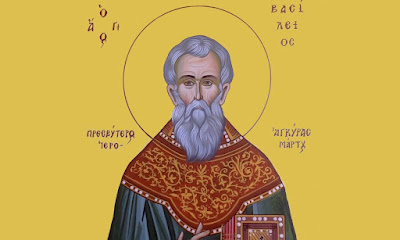Saint Basil Hieromartyr Elder of Ankara, March 22
Σώαν Προφήτης εἶπεν ἀλγεῖν κοιλίαν.
Τετρημένην δὲ Μάρτυς ἀλγεῖν οὐκ ἔφη.
Εἰκάδι δευτερίῃ Βασίλειος ἐτρήθη σούβλαις.
Hieromartyr Basil was born in the blessed by God eparchy of Helm, in the village Teratin during the 19th century. He descended from the proud Orthodox family Martis, his father Alexander was a judge and later became a priest. The young Basil was growing in an Orthodox pious atmosphere and was studying at the Hieratic School of Helm.
After his graduation, he married and at the age of 26 entered the priesthood. Later he was sent by his ecclesiastic authority as a hierapostle to Alaska, where he offered his priestly services, mostly serving at the islands Afognak and Kodiak. He discharged his priestly duties with toil and dedication and under the spiritual jurisdiction of the Russian Church, also serving for various periods in Pennsylvania in the States and in Canada.
After his return to his country in 1912, he was appointed officiating priest of the Orthodox parish in the city Sosnoviets (South Poland). When the 1st World War started, he found himself in a state of persecution and he was forced to become a refugee together with his family in Russia, where finally he ended up in Moscow at the Monastery of Saint Andronicus. He served wherever he happened to be, and he would also work as manual labourer to support his family. After the end of the war he returned to the city of Sosnoviets and to his parish.
In parallel with his parish duties, he tried to get a permit to serve as a military priest for the Orthodox soldiers of the polish army. In 1921 he managed to become the general hieratic man-in-charge and confessor of the army, receiving in fact the position of protopresbyter (protopriest). Finding himself in this position for fifteen years he offered with hard work and toil his services, solving and overcoming problems and difficulties stirred up by the heterodox and those with political agendas. He worked also with the first Archbishops George and Dionysius of Barsobia and of all Poland, also taking part in the process of the declaration of the Polish Church as Autocephalous in 1934, under the Ecumenical Patriarchate.
After his retirement he returned to his birthplace Teratin, with his family and there he passed the difficult years of the 2nd World War during which German and rebels - polish armies - passed through the region of Helm, hurting specifically the Orthodox people.
When the war ended and peace returned, the activity and hatred of the polish rebels increased towards the Orthodox local inhabitants (in full knowledge of the polish government and of the Latin clerics) and exactly then started the martyric Golgotha of elder Father Basil. His house was raided many times, threatening and terrorizing him, until in 1945 on Good Friday they surrounded his house and tortured him, pressing him to deny Orthodoxy. He however remaining steady in his faith, received the crown of martyrdom and surrendered his life for the holy faith of the Orthodox Church of Christ.
He was buried in Teratin and in 1963 they transferred his relics to Barsobia to the Orthodox cemetery and later in 2003 when it was decided to glorify him, they were taken and placed in a reliquary at the cemetery parish Church of Saint John of the Ladder in Barsobia.
Λειτουργικά κείμενα
Ἀπολυτίκιον
Ἦχος γ’. Θείας πίστεως.
Θείου Πνεύματος, τὴ ἐπινεύσει, χρῖσμα ἅγιον, ἱεροσύνης, ἐπαξίως ὑπεδέξω Βασίλειε, ὅθεν ὡς θῦμα βασίλειον ἔθυσας, τῷ βασιλεῖ τῶν αἰώνων τοὺς ἄθλους σου. Πάτερ Ὅσιε, Χριστὸν τὸν Θεὸν ἱκέτευε, δωρήσασθαι ἠμὶν τὸ μέγα ἔλεος.




Σχόλια